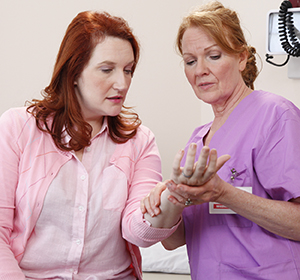Hives (urticaria) are red, itchy, and swollen areas (welts) on the skin. Sometimes hives are caused by an allergic reaction from eating a food or taking a medicine. Other times, hives can be caused by illnesses like the common cold. But sometimes the cause may not be known. A single hive can vary in size from a half inch to several inches. Hives can appear all over the body. Or they may appear on only one part of the body.
What causes hives?
Hives can be caused by allergies to food and drinks such as:
-
Tree nuts (almonds, walnuts, hazelnuts)
-
Peanuts
-
Eggs
-
Shellfish
-
Milk
-
Wheat
-
Soy
-
Colorings, preservatives, and spices used in foods
Hives can also be caused by medicines such as:
-
Antibiotics, especially penicillin and sulfa-based medicines
-
Anticonvulsant or antiseizure medicines
-
Chemotherapy medicines
Other causes of hives include:
-
Infection or virus
-
Heat
-
Cold air or cold water
-
Exercise
-
Scratching or rubbing your skin, or wearing tight-fitting clothes that rub your skin
-
Being exposed to sunlight or light from a light bulb, in rare cases
-
Inhaled chemicals in the environment from foods and medicines, insects, plants, or other sources
-
Latex allergy. If you already have a latex allergy, foods such as bananas, chestnuts, kiwis, or mangos can trigger hives.
In some cases, hives may occur again and again with no specific cause (idiopathic urticaria).
If you have hives
-
Stay away from the food, drink, medicine, or other thing that may be causing the hives.
-
Ask your healthcare provider how to control itchy or irritated skin.
-
Talk with your provider right away if you think a medicine or food gave you hives.
Watch for anaphylaxis
If you have hives, watch for symptoms of a severe reaction that can affect your entire body. This is called anaphylaxis. Symptoms can include swollen areas of the body, wheezing, trouble breathing or swallowing, and a hoarse voice. This reaction may happen right away, or it may happen in an hour or more. In extreme cases, the airways from mouth to lungs may swell and make breathing difficult. This is a medical emergency. Use epinephrine if you have it, and call
When to call your healthcare provider
Call your healthcare provider right away if:
-
Your hives feel uncomfortable
-
You have never had hives before
-
Your symptoms don't go away or come back
-
Your symptoms get worse or you have new symptoms, such as:
-
Sneezing, coughing, runny or stuffy nose
-
Itching of the eyes, nose, or roof of the mouth
-
Itching, burning, stinging, or pain
-
Dry, flaky, cracking, or scaly skin
-
Red or purple spots
-
Call 911
Call 911 right away if you have:
-
Swelling in your lips, tongue, or throat
-
Drooling
-
Trouble breathing, talking, or swallowing
-
Cool, moist, or pale (blue in color) skin
-
Fast and weak heartbeat
-
Wheezing or shortness of breath
-
Feeling lightheaded or confused
-
Diarrhea
-
Belly (abdominal) pain, cramps, or bloating
-
Severe nausea or vomiting
-
Seizure
-
Feeling dizzy or weak, or a sudden drop in blood pressure
-
Chest tightness
Author: Wheeler, Brooke
© 2000-2025 The StayWell Company, LLC. All rights reserved. This information is not intended as a substitute for professional medical care. Always follow your healthcare professional's instructions.

